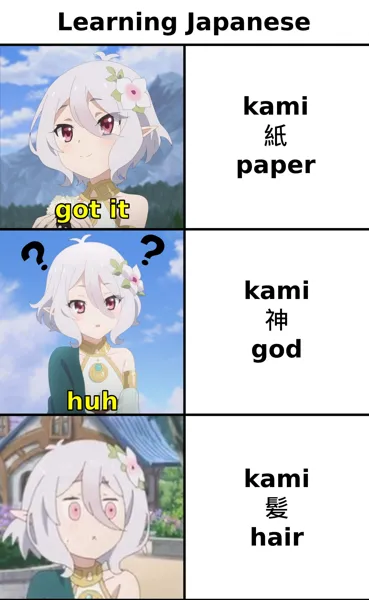this post was submitted on 03 Jul 2024
209 points (96.4% liked)
Animemes
1686 readers
97 users here now
Memes related to anime. Animemes.
Rules
- Don't be a shithead.
- Posts must be a meme with anime or related to anime or weeb culture.
- Use NSFW tag for lewd/ecchi. No explicit hentai.
- Nothing illegal, copyrighted, etc
- Repost only if the last post is 6 months old.
founded 1 year ago
MODERATORS
you are viewing a single comment's thread
view the rest of the comments
view the rest of the comments

Japanese has significantly fewer sounds than many languages, so homonyms are inevitable. Thanks to kanji this isn't much of an issue in written Japanese, but spoken Japanese (and Japanese written without the use of kanji) relies heavily on context.
The alternative would be ridiculously long words. Example: the English word "extra" (five letters, two syllables) is pronounced "ekisutora" in Japanese (still five letters, but also five syllables); this is a result of every consonant needing to be followed by a vowel (except for "n" and a short list of compounds like "sh"). Additionally, Japanese only has five vowel sounds, plus a few that you can force out (e.g. "ka" can be slightly modified to "kya" to approximate the "a" sound in "cat"). Japanese also contains fewer consonant sounds than a number of other languages.
I find fun to learn Japanese. It's the fourth language I study, and so far it's been both different and intuitive, but I fear the moment where I need to go deeper into kanji, given the limitations you mention.
It's also a slower process than learning any major language, as it took us a few weeks to get to review their letters. Its been fulfilling so far, but I don't know how invested one can be once you reach a certain point of increased complexity.
It depends on what your likes/dislikes are when it comes to languages. I much preferred learning kanji to memorizing noun genders and verb conjugations of European languages.